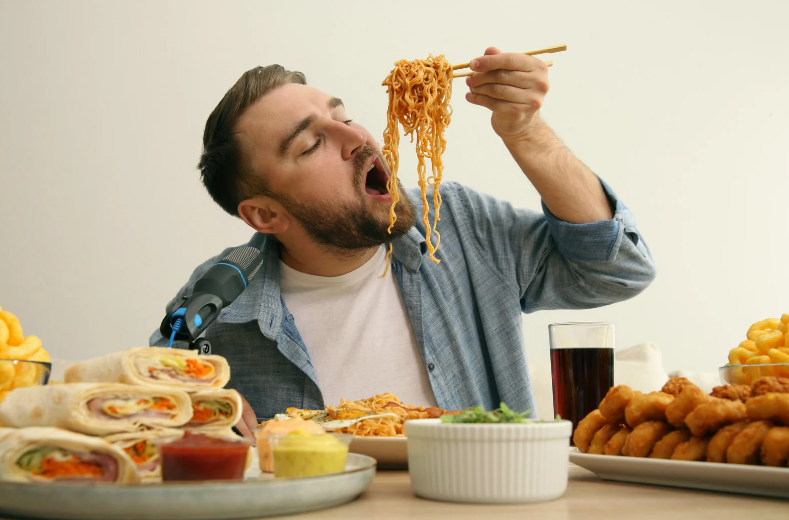When you're struggling to lose weight, it may seem like shedding that magic number of pounds is a guaranteed ticket to happiness. While it's true that getting fit and embracing a healthier lifestyle has a myriad of benefits—a spike in confidence, higher energy levels, lower blood pressure, greater mobility and improved heart health, to name just a few—some people who achieve significant weight loss are surprised to find that their new physique can come with some gloomy psychological effects.
According to a 2014 study by the University of London, more than 52 percent of participants who lost at least 5 percent of their body weight over a four-year period experienced depressed moods. "We do not want to discourage anyone from trying to lose weight, which has tremendous physical benefits, but people should not expect weight loss to instantly improve all aspects of life," Dr. Sarah Jackson, lead author of the study, said.
If getting healthy leads to so many life-changing benefits, what could be triggering the weight loss blues—and can they be avoided?
Reason #1: Deprivation
Weight loss plans often require cutting out favorite foods or even skipping social functions that may increase the chances of overeating, both of which can lead to dejection.
Instead of an all-or-nothing approach, try moderation instead of deprivation. It's okay to cheat on your diet from time-to-time (within reason), so you don't feel like you're missing out completely. Looking forward to the occasional treat will help buoy your spirits as the pounds melt away.
Still mourning the loss of French fries and ice cream? Despite the many benefits of achieving a healthy weight, it can be discouraging to give up the foods and routines you used to love. To help combat the weight loss blues, make a list of what inspired you to get fit. Whether it's to serve as a positive example for your kids, to reduce the risk of disease or just to feel more confident, chances are those reasons are a lot more important than the junk food you're craving.
Reason #2: The Hunger Hormone
As people lose weight, the body produces more of a "hunger hormone" called ghrelin. In addition to signaling that the body isn't getting the sustenance it needs, this hormone surge can also trigger a foul mood. Studies have shown that ghrelin is linked to anxiety and depression.
If you're not eating enough or spacing your mealtimes too far apart, you could become irritable. Keep mealtimes consistent so your body isn't subjected to appetite peaks and valleys. Make sure you're filling up on plenty of fiber, proteins and healthy fats, all of which help keep hunger at bay.
Speaking of consistency: Regulating your sleep patterns can also help squelch sadness, as fatigue can easily lead to irritability. Plus, a sleep deficit has been linked to increased cravings for unhealthy foods.
Reason #3: Fat Toxins
In addition to storing energy, fat cells also contain toxins called persistent organic pollutants (POPs). According to study findings in the International Journal of Obesity, as people lose weight, their fat cells release these chemicals into the bloodstream. Out of 1,099 participants, those who lost large amounts of weight had twice as many POPs in their blood than those who had gained weight. On top of slowing down weight loss, these pollutants can also cause general irritability.
To help counteract the effects of fat toxins, stick to a balanced diet that includes healthy fats and immunity boosters. Steer clear of artificial sweeteners, reduced-calorie options and processed foods. Make sure you're eating enough fruits, veggies, whole grains and lean meats to regulate moods and sustain high energy levels.
Reason #4: Unrealistic Expectations
As with any endeavor, striving for extreme results in a short amount of time is a recipe for disappointment, which can lead to feelings of depression. Instead of hopping from one diet craze to the next, try making a sustainable, long-term commitment to healthier eating and regular exercise. The pounds may not disappear as fast, but the ones that do are less likely to return—and you'll feel happier along the way.
The Weight Loss Blues
Related Articles
-
 Stop Emotional Eating Before It Starts
Stop Emotional Eating Before It Starts
-
 Turning Your Vision Into Action
Turning Your Vision Into Action
-
 Can Money Buy Happiness?
Can Money Buy Happiness?
-
 6 Ways to Maintain Your Mental Flexibility
6 Ways to Maintain Your Mental Flexibility
-
 The Power of Forgiveness
The Power of Forgiveness
-
 Why Getting Outside is So Good for You
Why Getting Outside is So Good for You
-
 Understanding Your Motivation
Understanding Your Motivation
-
 Come On, Get Happy!
Come On, Get Happy!
-
 Learning From Your Own Experience
Learning From Your Own Experience
-
 What Can One Minute of Mindfulness Do For You?
What Can One Minute of Mindfulness Do For You?



